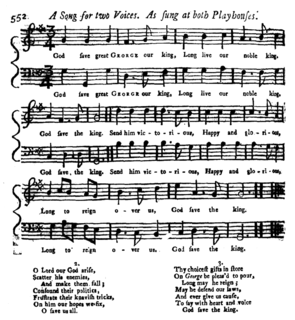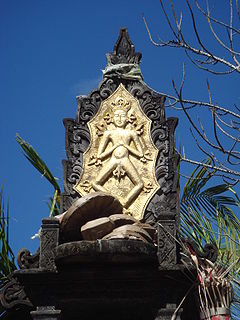This article does not cite any sources .(March 2021) (Learn how and when to remove this template message) |
Todote is the Samoyed god of evil and death, identified with the Turkic god Erlik.
This article does not cite any sources .(March 2021) (Learn how and when to remove this template message) |
Todote is the Samoyed god of evil and death, identified with the Turkic god Erlik.

Allah is the Arabic word for God in Abrahamic religions. In the English language, the word generally refers to God in Islam. The word is thought to be derived by contraction from al-ilāh, which means "the god", and is linguistically related to El (Elohim) and Elah, the Hebrew and Aramaic words for God.
Agnosticism is the view that the existence of God, of the divine or the supernatural is unknown or unknowable. Another definition provided is the view that "human reason is incapable of providing sufficient rational grounds to justify either the belief that God exists or the belief that God does not exist."

Abraham is the common patriarch of the Abrahamic religions, including Judaism, Christianity, and Islam. In Judaism, he is the founding father of the covenant of the pieces, the special relationship between the Hebrews and God; in Christianity, he is the spiritual progenitor of all believers, Jewish or Gentile; and in Islam he is seen as a link in the chain of prophets that begins with Adam and culminates in Muhammad.

Calvinism is a major branch of Protestantism that follows the theological tradition and forms of Christian practice set down by John Calvin and other Reformation-era theologians. It emphasises the sovereignty of God and the authority of the Bible.

A devil is the personification of evil as it is conceived in various cultures and religious traditions. It is seen as the objectification of a hostile and destructive force.

"God Save the Queen" is the royal anthem in a number of Commonwealth realms, their territories and the British Crown dependencies. The author of the tune is unknown, and it may originate in plainchant; but an attribution to the composer John Bull is sometimes made.

The Book of Genesis, the first book of the Hebrew Bible and the Christian Old Testament, is an account of the creation of the world, the early history of humanity, Israel's ancestors, and the origins of the Jewish people. Its Hebrew name is the same as its first word, Bereshit.

Mormonism is the religious tradition and theology of the Latter Day Saint movement of Restorationist Christianity started by Joseph Smith in Western New York in the 1820s and 30s.

Sunni Islam is by far the largest branch of Islam, followed by 85–90% of the world's Muslims. Its name comes from the word Sunnah, referring to the behaviour of Muhammad. The differences between Sunni and Shia Muslims arose from a disagreement over the succession to Muhammad and subsequently acquired broader political significance, as well as theological and juridical dimensions. According to Sunni traditions, Muhammad designated Abu Bakr as his successor. This contrasts with the Shia view, which holds that Muhammad announced his son-in-law and cousin Ali ibn Abi Talib as his successor. Political tensions between Sunnis and Shias continued with varying intensity throughout Islamic history and have been exacerbated in recent times by ethnic conflicts and the rise of Salafism and Wahhabism.
Rabbinic Judaism considers seven names of God in Judaism so holy that, once written, they should not be erased: YHWH, El ("God"), Eloah ("God"), Elohim ("God"), Shaddai (“Almighty"), Ehyeh, and Tzevaot. Other names are considered mere epithets or titles reflecting different aspects of God, but Khumra sometimes dictates special care such as the writing of "G-d" instead of "God" in English or saying Ṭēt-Vav instead of Yōd-Hē for the number fifteen in Hebrew.

The Christian doctrine of the Trinity holds that God is one God, but three coeternal and consubstantial persons: the Father, the Son, and the Holy Spirit. The three persons are distinct, yet are one "substance, essence or nature" (homoousios). In this context, a "nature" is what one is, whereas a "person" is who one is.

Yahweh was the national god of the kingdoms of Israel (Samaria) and Judah, with origins reaching at least to the early Iron Age and apparently to the Late Bronze Age. In the oldest biblical literature he is a storm-and-warrior deity who leads the heavenly army against Israel's enemies; at that time the Israelites worshipped him alongside a variety of Canaanite gods and goddesses, including El, Asherah and Baal, but in later centuries El and Yahweh became conflated and El-linked epithets such as El Shaddai came to be applied to Yahweh alone, and other gods and goddesses such as Baal and Asherah were absorbed into the Yahwistic religion.

Jehovah's Witnesses is a millenarian restorationist Christian denomination with nontrinitarian beliefs distinct from mainstream Christianity. The group reports a worldwide membership of approximately 8.7 million adherents involved in evangelism and an annual Memorial attendance of over 17 million. Jehovah's Witnesses are directed by the Governing Body of Jehovah's Witnesses, a group of elders in Warwick, New York, United States, which establishes all doctrines based on its interpretations of the Bible. They believe that the destruction of the present world system at Armageddon is imminent, and that the establishment of God's kingdom over the earth is the only solution for all problems faced by humanity.

An archangel is an angel of high rank. The word "archangel" itself is usually associated with the Abrahamic religions, but beings that are very similar to archangels are found in a number of religious traditions.

The Ten Commandments, also known as the Decalogue, are a set of biblical principles relating to ethics and worship that play a fundamental role in Judaism and Christianity. The text of the Ten Commandments appears twice in the Hebrew Bible: at Exodus 20:2–17 and Deuteronomy 5:6–21.

Adam is a figure in the Book of Genesis of the Hebrew Bible and Christian Bible, and also in the Quran. According to the creation myth of the Abrahamic religions, he was the first man. In both Genesis and Quran, Adam and his wife were expelled from the Garden of Eden for eating the fruit of the tree of knowledge of good and evil.

God, in monotheistic thought, is conceived of as the supreme being, creator, and principal object of faith. God is usually conceived of as being omnipotent (all-powerful), omniscient (all-knowing), omnipresent (all-present) and omnibenevolent (all-good) as well as having an eternal and necessary existence. God is most often held to be incorporeal (immaterial). God's incorporeality or corporeality is related to conceptions of God's transcendence or immanence ; Chinese theology exhibits a synthesis of both notions.
Atheism is in the broadest sense an absence of belief in the existence of deities. Less broadly, atheism is a rejection of the belief that any deities exist. In an even narrower sense, atheism is specifically the position that there are no deities. Atheism is contrasted with theism, which in its most general form is the belief that at least one deity exists.
God of War is an action-adventure game franchise created by David Jaffe at Sony's Santa Monica Studio. It began in 2005 on the PlayStation 2 (PS2) video game console, and has become a flagship title for the PlayStation brand, consisting of eight games across multiple platforms with a ninth currently in development. Based in ancient mythology, the story follows Kratos, a Spartan warrior who was tricked into killing his family by his former master, the Greek God of War Ares. This sets off a series of events that leads to wars with the mythological pantheons. The Greek mythology era of the series sees Kratos follow a path of vengeance due to the machinations of the Olympian gods, while the Norse mythology era, which introduces his son Atreus as a secondary protagonist, shows an older Kratos on a path of redemption, which inadvertently brings the two into conflict with the Norse gods.